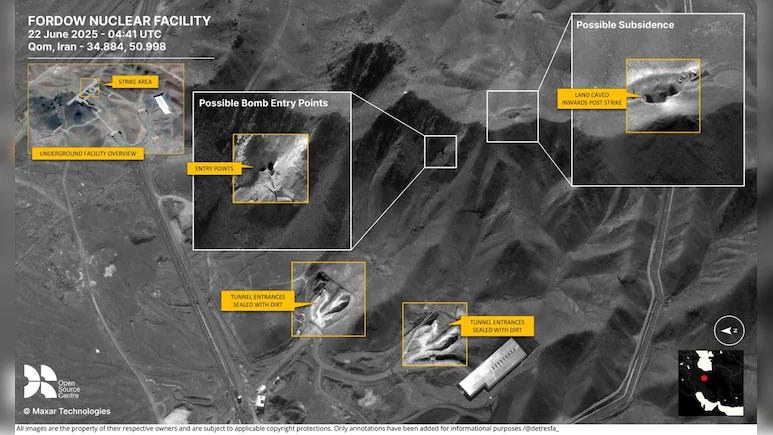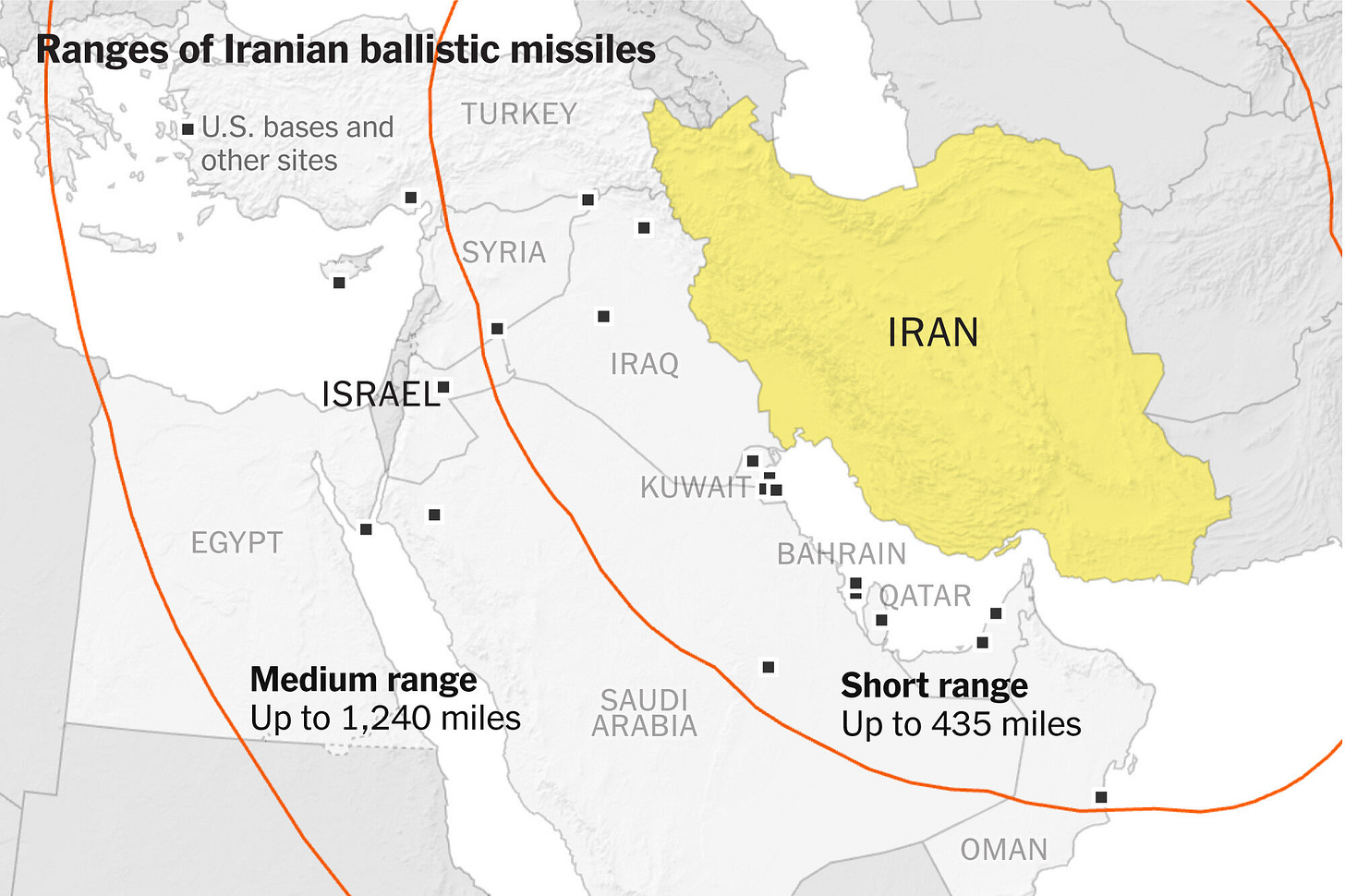A Leap Into the Unknown
The US Bombing of Iran May or May Not Serve American National Security Interests
President Trump’s sudden decision to strike Iran’s nuclear facilities definitely resulted in damage and grabbed world attention, but whether it makes a lasting contribution to US national security remains to be seen. Over the weekend, the US military dropped a dozen 30,000-pound bunker-buster bombs onto Iran’s subterranean Fordow nuclear fuel enrichment site. An additional 30 Tomahawk Land Attack Missiles (TLAMs) with 1,000 pound warheads hit other nuclear sites in Natanz and Isfahan. (All strikes were themselves non-nuclear.) Likely conducted at the behest of the Netanyahu administration in Tel Aviv, the US strikes damaged Iranian nuclear capacity significantly, but not permanently. While the strikes were probably permitted by international and US law, it is unclear whether they will make the US safer.
The use of military force is probably lawful. Critics in the US media claim that the lack of an imminent threat to the US from Iran undermines the legal justification for the strikes. It is true that we lack a formal mutual defense treaty with Israel, but international law allows countries to support each other against threats without one. Iran’s nuclear ambitions likely did not pose an imminent threat to Israel, but Iran has long contested Israel’s right to exist and actively supports the Houthis with the weapons used to attack Israel. Israel had the legal right to strike Iran and was not limited to conventional weapons sites; by extension, we had the right to do so on their behalf. Under US domestic law, only Congress has the power to declare war; however, the oft-debated War Powers Resolution allows the President to initiate military action, provided he reports it to Congress within 48 hours and receives authorization from Congress to carry on hostilities past 90 days. President Trump has given no indication that he intends to continue military action indefinitely. Indeed, if Iran abandons its nuclear program, he urges a cessation of hostilities.
But Is It Smart? US military actions should have a goal with a clearly defined end-state that contributes to US national security. We have an unfortunate history of getting involved in conflicts without an achievable vision of the future - see Vietnam, Iraq, and Afghanistan. Conversely, where the end-state has been clearly defined, we have avoided long-term entanglements - see Granada, Panama, and the First Gulf War.
President Trump’s goal appears to be delaying Iran’s capacity to produce a nuclear weapon, with the hope that they will permanently abandon that goal. Destroying the Fordow plant does delay production, but it seems unlikely to cause Iran to abandon the effort entirely. Iran’s religious government will not have missed the reality that many of the countries that gave up on their nuclear ambitions - South Africa, Libya, and Iraq, specifically - all had regime changes within 15 years. Those that persisted and achieved the production of nuclear weapons - Pakistan and North Korea - tend to enjoy greater regime longevity. And, from the perspective of international law, Iran has the legal right to a peaceful nuclear program, if not to use it to produce nuclear weapons.
Ultimately, the wisdom of the strikes depends on whether the temporary delay in Iran’s nuclear weapons production comes at too high a cost. The Iranian regime can make the world suffer for its injuries by mining the Strait of Hormuz, choking off the world from Persian Gulf oil, and punishing the US specifically by attacking the numerous US bases within range of Iran’s conventional missiles. (I served at two of those bases.) Iran has the capacity to cause a great deal of pain to the world economy and the US military, if it sees escalation to be in its own interest.
The enemy gets a vote. Despite provocative rhetoric from Tehran, Iran’s mullahs have backed down before in response to Israeli strikes, opting for limited missile exchanges, rather than full-scale war. Further, while Israel has struck some oil and gas sites relevant to Iran’s domestic supply, it has avoided striking Kargh Island, Iran’s main oil terminal, responsible for 90% of its exports. Without the oil exports the Iranian economy relies on, Iran’s government would have little incentive not to mine the Strait of Hormuz. Put another way, despite bellicose pronouncements from all sides, Iran, Israel, and the US all appear to be avoiding the kind of damage that would lead to unrestrained escalation.
Will it work? Time will tell. At the time of writing, I have seen some indication of Iran targeting US bases, but no significant strikes have occurred yet. Despite a vote in Iran’s Parliament to close the Strait of Hormuz, there have not been any reports of mines there or Israeli strikes against Kargh Island. Iran has other ways to restrict shipping—such as “stop and inspect” operations on tankers in the Gulf—that represent more limited escalations. Tehran will surely respond to US bombing, and the nature of their response will say much about the extent of their desire to keep the exchange limited. Or not.
Other News
Gender Affirming Care. I would be remiss if I did not note the Supreme Court’s tragic decision to uphold Tennessee’s ban in gender affirming care for minors. The decision to allow state legislatures to override the judgment of those minors, their parents, and their medical providers will certainly cost lives. In a small silver lining, their rationale does somewhat cut against the potential imposition of a national ban and the Trump Administration’s attempts to restrict medical care more generally. Here in Oregon, we should be grateful that the state government protects trans rights better than the federal government, although providers are still at some risk.
Transportation Package. The “heavy lift” of this legislative session has been a bill to increase transportation taxes and fees to support maintenance and upgrades for our roads. At the time of writing, the bill has passed out of committee and is awaiting votes on the floor of the House and Senate, where it will require a 3/5 vote to pass. Even if passed, it may be referred to the voters. As Rep. John Lively put it, “If it’s referred, it won’t pass. There’s no question. You’ll never convince enough people.” Complicating matters further, some Republicans have threatened a walkout. With less than a week left in the session, they can do so without being banned from re-election. Oregon desperately needs to fund maintenance of its roads better, but it remains to be seen whether this bill will succeed in doing so.
Disclaimer
The views expressed herein are those of the author and not necessarily those of the Department of Navy, the Department of Defense, the University of Oregon, or any other entity with which the author is affiliated.
Keep Letters from a Recovering Politician Free
As always, the best thing you can do to support this column is to share it with people who might be interested. I do not have a paid plan because I want folks to be able to access it without worrying about money. If you’d like to leave me a tip to show your appreciation, you can click on the “Buy Me a Coffee” button below. (Thank you to those of you who have suggested a PayPal link. I’ll try to figure that out soon.)








Regarding the transportation package you describe, I understand the need for funding. However, I am continually frustrated that the only solutions for such issues are solved by regressive taxation. Can you explain why the legislature seem adverse to taxing wealth?
David Thomas